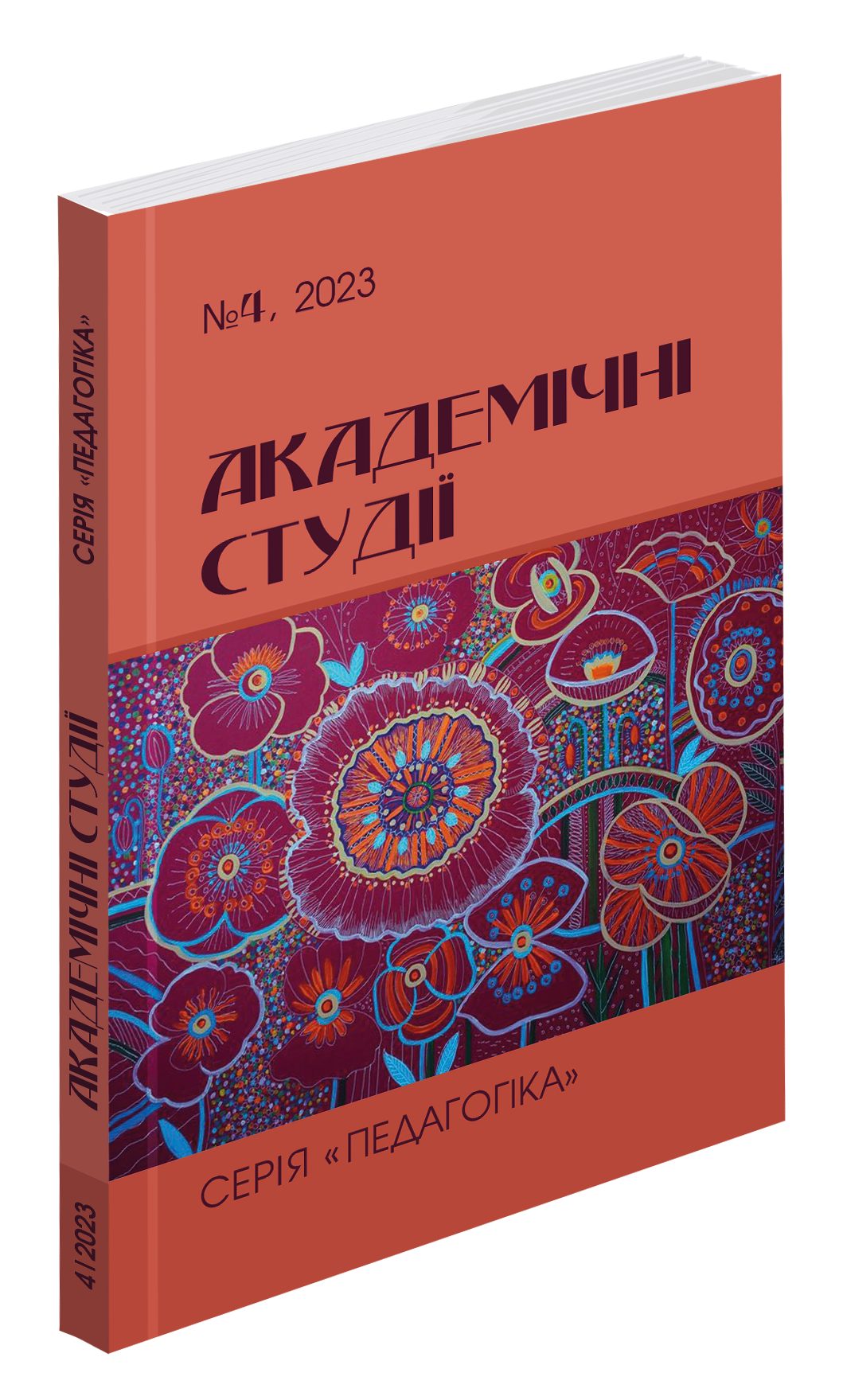Abstract
The article deals with exploring the pedagogical phenomenon of “pedagogical knowledge content” in the context of the globalization challenges faced by pedagogical education. Leading foreign and domestic interpretations of the concept of “pedagogical knowledge content” has been analyzed. It has been viewed by researchers as specific / personal-specific general “event” / “plot pedagogical models”, as transcendental knowledge of the subject regarding the educational context / processes of learning, teaching, and managing a group of students. It is stated that “plot pedagogical models” constitute a category within the concept of “pedagogical knowledge content”. Attention is focused on the key provisions of “plot pedagogical models”, such as: 1) it is the result of educational activity; 2) the teacher’s professional experience is the basis for the model; 3) the models correlate with the topic of the lesson. Additionally, it is worth noting the models of general pedagogical knowledge that differ in components: 1) managing a students’ group → teaching methods → assessing the learning group → educational process → students’ individual characteristics; 2) knowledge of the learning processes → awareness of students’ individual characteristics. The article presents a methodological toolkit for evaluating the level of novice teachers’ general pedagogical knowledge (indicators → simulated learning situations → tasks). An analysis of scholarly sources reveals that pedagogical content knowledge serves as the foundation for successful educational, teaching, and research activities in higher education institutions across various countries. It is currently widely acknowledged that within the context of modern trends in the development of the educational system, there is a continuous transformation of pedagogical content knowledge, necessitating updates and fostering the professional development of pedagogical / academic staff and the cultivation of specific skills.
References
Антонова О. Є. Базові знання з педагогіки : становлення, розвиток, технологія формування : монографія. Житомир : Житомирський державний університет, 2004. 276 с.
Волкова Н. П. Педагогіка : навчальний посібник. Київ : Академвидав, 2009. 616 с.
Попова О. В., Таможська І. В. Формування вмінь ділового спілкування майбутніх фахівців технічного профілю (на матеріалі вивчення соціально-гуманітарних дисциплін) : монографія. Дніпропетровськ : Видавництво Середняк Т. К., 2016. 250 с.
Таможська І. В. Зміст поняття «науково-педагогічна діяльність» в контексті сучасної парадигми освіти. Вісник університету імені Альфреда Нобеля. Серія «Педагогіка і психологія». Педагогічні науки. 2021. № 2 (22). С. 42–47. DOI: https://doi.org/10.32342/2522-4115-2021-2-22-5
Таможська І. В. Формування вмінь ділового спілкування майбутніх фахівців технічного профілю у процесі вивчення соціально-гуманітарних дисциплін : дис. … канд. пед. наук : 13.00.04. Харків, 2014. 294 с.
Brunner K., Obersteiner A. & Leuders T. How pedagogical content knowledge sharpens prospective teachers’ focus when judging mathematical tasks : an eye-tracking study. Educational Studies in Mathematics. 2023. DOI: https://doi.org/10.1007/s10649-023-10281-6
Cerbin W., Kopp B. Lesson Study as a Model for Building Pedagogical Knowledge and Improving Teaching.
International Journal of Teaching and Learning in Higher Education. 2006. Vol. 18(3). 250–257.
Choy D., Wong A. F. L., Lim K. M. & Chong S. Beginning teachers’ perceptions of their pedagogical knowledge
and skills in teaching : A three year study. Australian Journal of Teacher Education. 2013. Vol. 38(5). 68–79. DOI: https://doi.org/10.14221/ajte.2013v38n5.6
Goes L. F, Fernandez C. Evidence of the Development of Pedagogical Content Knowledge of Chemistry Teachers
about Redox Reactions in the Context of a Professional Development Program. Education Sciences. 2023. 13(11):1159.
DOI: https://doi.org/10.3390/educsci13111159
Guerriero S. Teachers’ Pedagogical Knowledge and the Teaching Profession : Background Report and Project
Objectives. 2014. 7 p. URL: chrome-extension://efaidnbmnnnibpcajpcglclefindmkaj/https://search.oecd.org/education/
ceri/Background_document_to_Symposium_ITEL-FINAL.pdf
Guntari I. S., Jatmika S. Application of TPACK (Tecnological Pedagogical Content Knowledge) in Accounting
Subjects at Vocational High School (SMK) Batik 1 Surakarta. Jurnal Ilmu Pendidikan. 2023. Vol. 6(4). 843–853. DOI :
https://doi.org/10.37329/cetta.v6i4.2819
Hashweh M. Z. Teacher pedagogical constructions : A reconfiguration of pedagogical content knowledge. Teachers
and Teaching : Theory and Practice. Teachers and Teaching : theory and practice. 2005. Vol. 11(3). 273–292. DOI:
https://doi.org/10.1080/13450600500105502
Hudson P. Strategies for mentoring pedagogical knowledge. Teachers and Teaching. Theory and Practice. 2013. Vol. 19. Issue 4. 363–381. DOI: https://doi.org/10.1080/13540602.2013.770226
Leijen Ä., Malva L., Pedaste M., & Mikser R. What constitutes teachers’ general pedagogical knowledge and how
it can be assessed : A literature review. Teachers and Teaching. 2022. Vol. 28. Issue 2. DOI: https://doi.org/10.1080/1354
2022.2062710
Park S., Jang J.-Y., Chen Y.-C., Jung J. Is Pedagogical Content Knowledge (PCK) Necessary for Reformed Science
Teaching? : Evidence from an Empirical Study. Research Science Education. 2011. Vol. 41. 245–260. DOI: https://doi.
org/10.1007/s11165-009-9163-8
Supporting the Teaching Professions for Better Learning Outcomes. Rethinking Education : Investing in skills for
better socio-economic outcomes : Communication from the European Commission. Strasbourg, 2012. 65 s.
Shulman L. S. Those who understand : Knowledge growth in teaching. Educational Researcher. 1986. 15(2), 4–14.
Tamozhska I., Tymofiienko N., Demianiuk A., Klyap M. & Tsurkan M. Features of professional and pedagogical
activity of a higher education teacher. Amazonia Investiga. 2023. 12(63). 148–155. DOI: https://doi.org/10.34069/
AI/2023.63.03.13
Voss T., Kunter M. & Baumert J. Assessing Teacher Candidates’ General Pedagogical / Psychological Knowledge
: Test Construction and Validation. Journal of Educational Psychology. 2011. Vol. 103(4), 952–969. DOI: https://
doi.org/10.1037/a0025125
